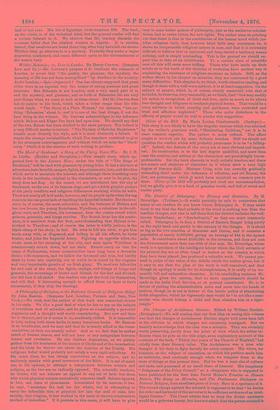The Maid of Stralsund: a Story of the Thirty Years
War. By J. B.
de Liefde. (Hodder and Stoughton.)—This simple story, which ap-
peared first in the Leisure Hour, under the title of "The Siege of Stralsund," will be read with pleasure by young folks. It has a mixture of adventure,hair-breadth escapes, fights, imprisonments, love, and devotion which serve to maintain the interest, and although there is nothing very fresh in the incidents, original in the characters, or new in its plot, the story does not flag. At the outset, we are introduced into the city of Stralsund, on the eve of its famous siege, and get a fairly graphic picture of the party confficta and religious differences seething within its walls. These are nearly all laid aside, however, and its people unite when the tag comes in the one great task of repelling the Imperial invader. But the love. story is, of course, the most attractive, and the fortunes of Helena and her two lovers, the young Scotchman, Wyndham, a volunteer in the reli- gious wars, and Theodore, his townsman, form the centre round which princes, generals, and kings revolve. The Scotch lover has the prefer- ence, it is manifest from the first, notwithstanding that Helena is be- trothed to Theodore ; and of course the latter is wildly jealous, is the black-sheep of the story, in fact. He tries to kill his rival, to get him made away with, or disgraced, and failing in all his efforts, he turns traitor, and joins the Imperial Army. Fighting on opposite sides, tho rivals meet at the storming of the city, and once again Wyndham is treacherously struck down, but not slain. Events carry us into the camp of Wallenstein, whose eccentricities have long been a favourite theme with romances, and we follow the favoured and true, but hardly dealt by lover into captivity, out of which he is raised by the singular and very improbable pranks of an Irish gipsy. We need not follow the ins and out of the story, the fights, sayings, and doings of kings and generals, the mournings of lovers and friends for the lost and divided, nor tell how it all ended. Our readers can get the book for themselves, and will find it interesting enough to afford them an hour or two's amusement, if they skip the theology.


































 Previous page
Previous page